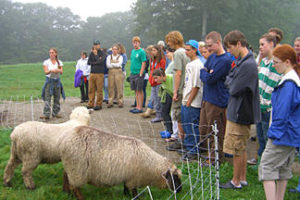 |
| The farm crew teaches a group of MCS students about production and livestock management at Salt Marsh Farm. |
Family-Farm Philosophy in a High School Semester
By Molly Schaffner
Photos by Scott Andrews and Margaret Youngs
Nestled between salt marsh and woods, tangent to a school and a summer camp, lies the Chewonki Foundation’s Salt Marsh Farm. The rolling 25 acres have a long history of fertility on this peninsula in Wiscasset. Before they became part of the Chewonki Foundation in 1960, they were the home and livelihood of a family. Now the family-farm philosophy is being embraced again, this time in a way that complements production with education, and that weaves community members into the process of production.
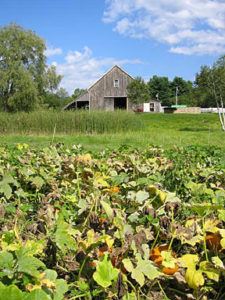 |
| The barn at Salt Marsh Farm sits above the fields and is the center point for all educational activities that come through the farm. |
Salt Marsh Farm is a mixed subsistence farm that accomplishes a wide variety of tasks. In the fields are livestock, including a couple of dairy cows, calves, ewes and a ram. On either side of the barn are chickens for both laying and meat, and pigs. A three-bin composting system steams as it turns food waste into usable humus. One and one-half of this farm’s acres are dedicated to cultivated gardens; the remaining 15 are open for pasture and haying. Nearby are 150 acres of woodlot, where the draft horse works in the months of frozen ground.
Horsepower provides much of the energy on the farm, as sustainability is an ongoing goal here. All the harvested wood, which is pulled by the draft horse, is used to heat many of the buildings on the Chewonki campus. In warmer months, the farm’s tractor runs on biodiesel, which is produced by people working in renewable energy at Chewonki. Soon, wind power will be joining the forces at the Salt Marsh Farm.
Brad Johnson, the farm and woodlot manager, and Margaret Youngs, the assistant manager, along with a continually shifting work force, each year produce not only 15,000 to 20,000 pounds of vegetables, but also milk, eggs, fiber, and 30 cords of firewood. All of this produce doesn’t go to the farmhouse kitchen or even to a farmers’ market, although the past couple of summers have seen a small, 10-person CSA for Chewonki staff members. The bulk of the produce goes to the Chewonki kitchen, which feeds students, campers, teachers and staff members. “If we were to think about it as a commercial farm, the kitchen is our market. The kitchen drives what we grow,” explains Johnson.
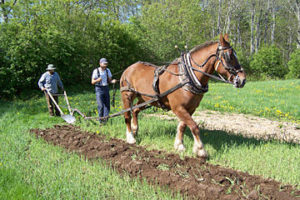 |
| A farm intern (a former MCS student) and the former farm manager use the draft horse to plow in a winter cover crop. |
It’s a mighty call to answer to, considering that lunches during the school year feed 80 to 85 people, many of whom are students at the Maine Coast Semester (MCS), a program for high school juniors. Summers prove even more demanding: When Camp Chewonki is in session, two seatings of every meal are necessary. Although, according to Johnson, the farm probably provides less than 20% of the food in the kitchen, its contribution is anything but unnoticed. “They incorporate our food really effectively,” says Johnson. The goal is for each meal to incorporate something from the farm, and those foods are clearly announced to the enthusiastic dining hall. At the end of the meal, community members sort their scraps into slop, to be consumed by the pigs, and compost.
But the community at Chewonki sees much more of the farm than the food on their plates. “The other half of what we do is education,” said Johnson. This is really how the Salt Marsh Farm sets itself apart from other farms: Virtually every participant of a Chewonki program visits the farm to supplement his or her education.
The Salt Marsh Farm accommodates different groups of students different ways. “During MCS we are heavily, heavily involved in education,” comments Johnson. Groups of seven to nine students, which rotate according to cabin, wake up early each day for two weeks to do farm chores, which range from turning compost, to collecting eggs, to milking. Each afternoon, a group of students comes to the farm for “work program,” a two-hour block of hands-on work that enriches the students’ rigorous academic schedule.
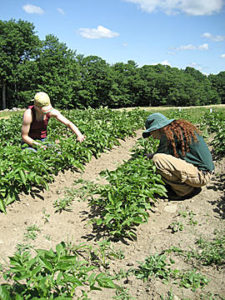 |
| Lillian Betke-Brunswick (left) and Becca Abuza (right), both former MCS students who returned to Salt Marsh Farm during the summer, tend potatoes. |
Becca Abuza, a former MCS student who has returned to work as a farmhand at the Salt Marsh Farm for the last two summers, reflects that “work program was all of the exciting things.” Activities include harvesting, weeding, chopping wood, and other obligatory farm tasks. But the kind of labor the students experience at the farm isn’t dumbed down; in the spring, students learn to use a chainsaw (with permission from parents), and in the fall, they have the option of participating in processing chickens. “I want to actually teach you to do something besides hold that hammer,” explains Johnson, who fervently agrees with the motto ‘head, heart and hands.’ “I look out and I see kids plowing the field with our draft horse … It’s amazing what you can do with a 16-year-old.”
When Camp Chewonki is in session, the balance between production and education is able to lean toward the former. Yet the campers, ages seven to 13, can still learn from the farm. They participate in “farm activity,” in which counselors teach about subjects such as the food cycle and composting, or the draft horse and firewood. Also, the campers maintain a small garden. Throughout the year as well, groups of children in a Chewonki program called Outdoor Classroom stop by the Salt Marsh Farm for a few minutes of enlightenment.
Lillian Betke-Brunswick, like Abuza, decided to work at the farm for the previous two summers after her MCS experience. She has found the value of showing curious community members something about the farm. “Occasionally when there are wilderness trips coming through or Outdoor Classroom groups, we’ll show them milking demonstrations or we’ll show them composing,” she recalls. “Last year I was picking hornworms off tomatoes so I showed them to the campers and we talked about them … maybe you lose 10 minutes when you could have picked four tomatoes but it’s definitely worth it.”
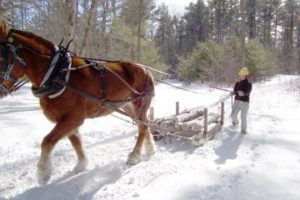 |
| An MCS student drives the draft horse Sal out of the woodlot after collecting logs for firewood. |
Dividing time between working and teaching is the hardest task on the farm for Johnson. “We’re constantly trying to mesh these two goals …that’s the single greatest challenge.”
Working at the Salt Marsh Farm requires sacrifices daily and seasonally. Unlike many farms, there is no off-season here. “This job is incredibly relentless because there are only a handful of weeks throughout the year without an education program,” continues Johnson. “Even if it’s not a program that you’re expected to teach, it’s very difficult to draw a line between home and work. It’s part of the fun.”
The rewards of farming in an educational environment mean a steady paycheck as well as the opportunity to see young and old learn to use their hands and appreciate the efforts of small farms. “It’s so satisfying to watch students blossom,” Johnson says.
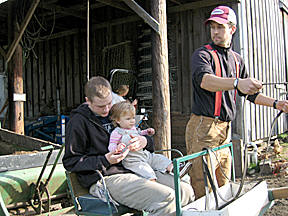 |
| Farm manager Brad Johnson, his daughter, and an MCS student (right to left), practice driving the draft horse. |
Although the lively farm manager claims that he’s not trying to produce farmers, the Salt Marsh Farm is certainly leaving its mark on many young people. Betke-Brunswick wants to work on farms in the future, and although she has yet to decide on a specific career, she says, “whatever I want to do, I want to be connected to the land as much as I can. I want a life where you see all the repercussions of what you do.” Abuza is similarly passionate about working with the land. “I was super lucky that this was the first farm I came to. They’re so conscientious about everything they do … so I have high expectations.” And while the Salt Marsh Farm continues its unyielding cycle of production, more people join the community at the Chewonki Foundation and really learn what it means to grow.
About the author: Molly Schaffner, 18, is a resident of Brunswick. She attended the Maine Coast Semester in 2005 and has since spent time at Crystal Spring Farm. This fall she will attend Smith College, where she will be studying Latin American Studies and Dance.
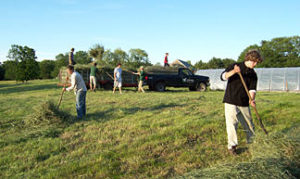 |
| Members of the Chewonki community help the farm staff bring in loose hay. |
About the Maine Coast Semester
The Maine Coast Semester at the Chewonki Foundation in Wiscasset offers high school juniors a chance to spend a semester learning not just academics, but also about community. The program takes 35 to 40 students from all over the country each semester. The mission of the program is to instill an understanding of and appreciation for the natural world, and for community.
Classes at MCS range from 3 to 10, and teachers and students work closely – as partners in learning but also as friends. Students and faculty eat meals and do chores together, among other things.
The students have a challenging course load of such standard subjects as Math, U.S. History and languages, and more unusual subjects. In The Natural History of the Maine Coast, students explore the different ecosystems of Maine and their patterns. English classes include Literature and the Land, and Ethics: Understanding and Choice. Environmental Issues is another popular class, which requires students to delve into and report on an environmental issue of their choice. Art class stresses incorporating the natural world in art.
Another element of the MCS education is being a physically active community member. Chewonki has no janitors, because students maintain the campus themselves. Morning chores, including taking out the recycling, starting the furnaces and cleaning students’ bathrooms, help make students aware of their connection to their environment.
Students spend two hours twice a week working on the farm or on maintenance jobs. Recent MCS students built a new cabin, complete with PV panels, an electricity-producing bicycle and other elements of sustainability. Soon, six to eight MCS students will inhabit that cabin, and they’ll be responsible for starting and maintaining fires in the wood stove.
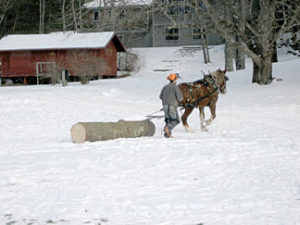 |
| Brad Johnson and Sal, the farm’s draft horse, pull a heavy log, to be used for firewood, across the Chewonki campus. |
One of the larger challenges of the program is the solo, a three-day reflection period in which a student situated on the waterfront near the campus must rely on him or herself.
The unique atmosphere at the Chewonki Foundation allows students to live with more responsibility and independence than at most schools, and the symbiotic themes of trust and respect help to develop maturity and idealism in students.
The Maine Coast Semester is on the verge of being accredited by the New England Association of Schools and Colleges, an accomplishment that should attract more students.
More information can be found at the Chewonki Foundation at (207) 882-0979 or at www.chewonki.org
